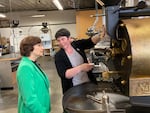
Emily Smith of Hacea Coffee Source shows U.S. Rep. Suzanne Bonamici, D-Beaverton, coffee roasting equipment Thursday afternoon at Southeast Portland’s Buckman Coffee Factory. Bonamici met with members of the coffee industry to hear about damage from tariffs on May 29, 2025.
Kyra Buckley / OPB
Leaders from Oregon’s coffee industry say tariffs are driving up the price for the Pacific Northwest staple.
That’s what representatives from coffee importers, roasters and retailers told U.S. Rep. Suzanne Bonamici, D-Beaverton, Thursday afternoon at Southeast Portland’s Buckman Coffee Factory.
The meeting came within hours of the U.S. Court of Appeals saying Pres. Trump’s tariffs could stay in effect as it considered a challenge to an International Trade Court decision declaring the import taxes illegal. That means U.S. companies will continue to pay a 10% tariff on nearly all goods — including coffee — coming from other countries, among other tariffs still in effect from the administration.
“We are a small family-owned importing company, and we work directly with farmers all around the world,” Emily Smith with wholesale coffee importer Hacea Coffee Source told Bonamici during a tour of Buckman Coffee’s roasting warehouse. “We are being hit with the 10% tariff on everything. Everything.”
Hacea Coffee Source has its main office in Anaheim, Calif., but Smith is based in Portland. The company sells to roasters all over the country, and Smith says that includes Portland businesses Upper Left Roasters and Pastime Coffee.
“Our margin is only 10% on our coffee,” Smith explains of the wholesale green coffee beans Hacea imports and sells to roasters. “So we have to pass the costs along.”
Smith along with a dozen members of Oregon’s coffee industry said that, at minimum, they want Oregon leaders to push for coffee beans to be excluded from President Donald Trump’s tariffs.
As the president levied widespread tariffs on virtually all trading partners, businesses in Oregon told state leaders the move will have lasting damage on trade relationships. Business owners say the cost to do business is going up, and layoffs or other cost-cutting measures could be on the horizon.
In many cases, businesses say they’d like to find domestic sources instead of importing products. But that’s nearly impossible for items like coffee beans, which are grown in areas specifically suited to it, such as Brazil, Vietnam and Colombia. The climate in the U.S. isn’t appropriate for large scale coffee crops.
“What has happened just in the past few months with this administration and with tariffs has been chaotic,” Rep. Bonamici told the coffee industry leaders.
She said she hopes the U.S. Court of Appeals will side with the International Trade Court in ruling the tariffs illegal, saying that only Congress can enact such widespread import taxes. The Appeals court has not indicated when it may rule, but has asked each party to respond by June 9.
